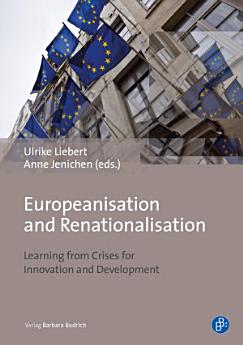Europeanisation and Renationalisation: Learning from Crises for Innovation and Development
Anne Jenichen · Ulrike Liebert
জুলাই ২০১৯ · Verlag Barbara Budrich
ইবুক
323
পৃষ্ঠা
family_home
যোগ্য
info
reportমূল্যাংকন আৰু পৰ্যালোচনা সত্যাপন কৰা হোৱা নাই অধিক জানক
এই ইবুকখনৰ বিষয়ে
The book explores how the European Union and its members have been renegotiating Europeanisation and renationalization in response to the multiple crises they faced over recent years. The authors highlight varying understandings of ‘crises’ in different national and supranational policy and institutional contexts. They show how in some cases these have challenged the legitimacy of European Union norms and institutions and even triggered disintegration, while in others these crises have served as sources of inspiration for European social innovation and political development.
লিখকৰ বিষয়ে
Prof. Dr. Ulrike Liebert is a professor at the University of Bremen, Germany.
Dr. rer. pol. Anne Jenichen is a lecturer in politics and international relations at Aston University, Birmingham, UK.
Dr. rer. pol. Anne Jenichen is a lecturer in politics and international relations at Aston University, Birmingham, UK.
এই ইবুকখনক মূল্যাংকন কৰক
আমাক আপোনাৰ মতামত জনাওক।
পঢ়াৰ নির্দেশাৱলী
স্মাৰ্টফ’ন আৰু টেবলেট
Android আৰু iPad/iPhoneৰ বাবে Google Play Books এপটো ইনষ্টল কৰক। ই স্বয়ংক্রিয়ভাৱে আপোনাৰ একাউণ্টৰ সৈতে ছিংক হয় আৰু আপুনি য'তে নাথাকক ত'তেই কোনো অডিঅ'বুক অনলাইন বা অফলাইনত শুনিবলৈ সুবিধা দিয়ে।
লেপটপ আৰু কম্পিউটাৰ
আপুনি কম্পিউটাৰৰ ৱেব ব্রাউজাৰ ব্যৱহাৰ কৰি Google Playত কিনা অডিঅ'বুকসমূহ শুনিব পাৰে।
ই-ৰীডাৰ আৰু অন্য ডিভাইচ
Kobo eReadersৰ দৰে ই-চিয়াঁহীৰ ডিভাইচসমূহত পঢ়িবলৈ, আপুনি এটা ফাইল ডাউনল’ড কৰি সেইটো আপোনাৰ ডিভাইচলৈ স্থানান্তৰণ কৰিব লাগিব। সমৰ্থিত ই-ৰিডাৰলৈ ফাইলটো কেনেকৈ স্থানান্তৰ কৰিব জানিবলৈ সহায় কেন্দ্ৰত থকা সবিশেষ নিৰ্দেশাৱলী চাওক।





